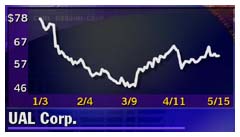|
Unfriendly skies hit flights
|
 |
May 15, 2000: 2:36 p.m. ET
Labor pains at employee-owned United see pilots refusing overtime flights
By Staff Writer Chris Isidore
|
NEW YORK (CNNfn) - United Airlines moved to scale back its schedule Monday so it could make do without flight crews flying on overtime.
Many pilots and other crew members stopped flying on overtime beginning last week to express disappointment with the state of contract negotiations. Negotiators with the Air Line Pilots Association and United, the world's largest airline, were due to meet with federal mediators Monday, but neither side would predict an agreement is close.
The current contract, in effect since pilots became part owners of the carrier in 1994 through an employee stock ownership plan, became open for renegotiation April 12.
"There are people disappointed out there," said Herb Hunter, a Miami-based United captain and a spokesman for the union. "We thought the last five and a half years of the ESOP would make a difference in these contract negotiations."
But Hunter denies the union is urging members not to fly on overtime. Pilots have the right to refuse to fly overtime, but a coordinated effort by the union would be illegal under the Railway Labor Act, which governs labor law for airlines.
Employee owners have clout at the table
The company said it had not been making unusually heavy use of pilot overtime for its schedule before the protest started.
"The pilots were normally willing to fly those trips," said Joe Hopkins, a spokesman for the airline. Hopkins said about 17 of 2,400 flights were cancelled due to crew shortages Monday, down from more than 300 over the weekend. An additional 40 flights were cancelled Monday due to bad weather, primarily in the San Francisco area.
Hopkins said the company still is hopeful of reaching an agreement with ALPA, which represents just over 10,000 crew members. He said the company is trying to hire about 1,200 new pilots this year, but Hunter said about 400 them will replace retirees and won't help what the union terms a pilot shortage.
 One analyst said investors need to be a bit concerned because of the leverage the pilots have as employee-owners with a representative on the board of directors of parent UAL Corp. (UAL: Research, Estimates). One analyst said investors need to be a bit concerned because of the leverage the pilots have as employee-owners with a representative on the board of directors of parent UAL Corp. (UAL: Research, Estimates).
"Management has to answer to the pilots, but they also have a due diligence to public stockholders," said Ray Neidl, airline analyst with ING Barings. "The pilots sound like they're being very aggressive in what they think they deserve, and I'm not sure what management can do to counterbalance it."
No impact on earnings so far, analyst says
Neidl said the flight cancellations to date probably haven't been enough to hit earnings, but could cause a 1 to 3 cent a share hit in the quarter, depending on how long they last. Analysts surveyed by First Call forecast United will earn $2.91 a share in the second quarter, up from $2.86 a year ago and the $2.42 estimate for the current quarter before the company raised its earnings guidance April 19.
Neidl said the bigger concern for investors is the details of the new contract.
Neidl and Hunter said sticking points in talks include pay, benefits and the greater use of smaller jets by United Express, United's commuter and feeder carrier, most of whose pilots are not represented by ALPA.
"I think that's very important that United gets flexibility on regional jets," Neidl said.
ESOP resulted in pay gap with other carriers
Pay also is a key issue. A captain at United earns between $125,000 and $200,000 a year, according to Hunter, which he said is well below scale at other major carriers. Neither Hunter nor Hopkins would discuss the pay proposals the two sides have brought to the table so far.
United pilots got a 7.6 percent raise April 12, but that brought them up only to their 1994 pay scale, and they no longer receive stock as they did during the previous 5-1/2 years to even out the difference with competitors.
The pay difference was relatively small among major carriers in 1994, but the United pilots now are well behind others, said Kit Darby, president of Air Inc., an Atlanta job placement and information agency for the airline industry. He said the pilot of the largest jet at United gets an average of $18,000 a month, compared with $20,607 for a pilot at industry pay leader Delta, who also has to work fewer hours than the United pilot for that pay level.
Some think it's strange that pilots would take action against an airline in which they own a major stake.
"It just shows you the advantages of employee ownership," Neidl said sarcastically.
But Hunter said most of the pilots aren't concerned about the immediate value of the stock because they are locked into holding the shares until retirement. He said cooperation between management and the employee-owners has to be a two-way street.
"We want the stock to do well, but for many pilots the stock seems like Monopoly money," he said. "The one thing we really want is for everyone to act as a team. I'm not sure where the ESOP is going or if the management team is excited about having us on the board."
Shares of United rose 1/4 to 60-3/4 Monday on a positive day for airline stocks due to investor hopes for rising air fares. 
-- Click here to send email to Chris Isidore
|
|
|
|
|
 |

|

